DataExplorer is looking for contributors for new supported languages and/or new supported devices. If you're interested, please take a look at this Contributing. Thanks.
The DataExplorer is free software, please see https://www.gnu.org/philosophy/free-sw.html. It is also available at no cost, but without any warranty. Since the implementation is based on Java, using free available libraries for data communication and SWT, the execution of this program is possible under a number of popular operating systems like 32/64 Bit GNU/Linux and MS Windows and Mac OS. The only requirement is the installation of a Java run-time of version 8 to Java 17 for the 32 bit versions and Java 11 to 17 for the 64 bit versions, such as IcedTea or open JDK. For simplicity, the 64 bit versions for Windows and MAC OS are provided with built-in Java run-time. There is no need to install a Java runtime for these cases. Since the MAC OS versions are based on Intel code, DataExplorer runs in the Rosetta emulation layer. An Android version of DataExplorer is available via PlayStore. The DataExplorer gathers data from connected devices and display this data for a various of further analysis. Actual the following devices are available as plug-in:
More device are under construction. Help doing this is very welcome.
New similar to existing devices can be easily created by using the integrated DevicePropertyEditor application without coding effort. A device API (IDevice) is defined to enable a relative simple adaptation of a new device as plug-in to integrate into the application framework.
Inquiries about APIs and how to integrate new devices into the framework are welcome (send questions to https://lists.nongnu.org/mailman/listinfo/dataexplorer-help or direct to the maintainer mailto:Winfried.Bruegmann@web.de.
Ubuntu, Kubuntu, Mac OS X, Windows 7, Windows XP (klick to resize)
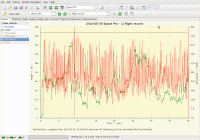
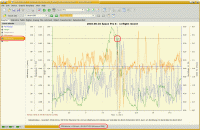
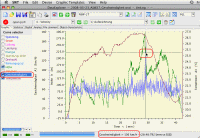
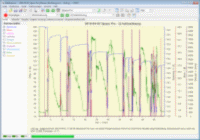
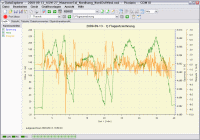
The latest version of DataExplorer can be found and downloaded at downloads or https://download-mirror.savannah.gnu.org/releases/dataexplorer/. Currently, the latest is quite often the greatest, so consider trying out the anonymous checkout of GIT provided on savannah.
DataExplorer for 32 bit will be distributed without a bundeled Java runtime environment. Also for GNU/Linux systems is this the case, independent of 32 or 64 bit. With this the system administrator has control over installed Java runtime. Therefore there is a need to provide a Java runtime environment by installation if not already available. In most cases a JRE (Java Runtime Environment) fulfills the DataExplorer requirements to execute successfully. Older operating systems may get updates with latest release of DataExplorer. With GNU/Linux-systems it is simple to install Java, just select from the connected software repository and a reasonable Java will be installed. This will install a Java which fits the system architecture, 32/64 Bit. A Windows-system allows, at least a 64 bit system, to install both in parallel, a 32 bit and a 64 bit Java runtime environment. Since from DataExplorer both versions 32 and 64 bit are available it is important to install fitting versions. A 32 bit DataExplorer requires a 32 bit Java. To verify which Java version is available just type "java -version" in a command line. Does this not respond with an version answer the Java executable is not installed or not reachable by the path. Any responds will contain a hint which bit version is installed. An Apple-system with MAC OS X and Intel based processor is always 64 bit. Please use the 32 bit version of the DataExplorer for Power processor based system only. For a MAC OS X also a Java runtime environment would fulfill the execution requirement. For unknown reason the JRE Java executable is not reachable. Therefore it is required to install a Java SE or development environment (JDK). Please be patient for that while downloading. JDK (Java Development Environment) can be downloaded directly from Oracle. The overall procedure while start-up trouble should be to open a command line prompt (GNU/Linux bash, Windows command line shell, MAC OS X Terminal) and change into the directory in which you find the DataExplorer start executable (GNU/Linux DataExplorer script, Windows DataExplorer.exe, MAC OS X DataExplorerMac64 script). In this directory execute "java -Dfile.encoding=UTF-8 -jar ./DataExplorer.jar". If there are some errors with the Java environment you will get an meaningful responds. To check out if Java can be executed at all just enter "java -version". Problems while downloading a usable Java runtime environment? Please drop me a mail.
The DataExplorer application should sometimes run on a system with a back-level operating system. Hopefully the system doesn't connected to Internet while the operating system doesn't receive updates anymore! The Java runtime or service environment should be already installed with version 8 (1.8). Java installation executables may hard to find or not be available anymore. Actual GNU/Linux systems comes with GTK4 instead of GTK3/2. The SWT-toolkit with version 4.* support both. Anyhow sometimes an older SWT-toolkit results in a better UI representation while using a back level Linux with GTK2. Export SWT_GTK3=0 to force usage of GTK2 (start script) or try an older SWT-toolkit (swt.jar). Windows XP does not support SWT-toolkit 4.* as actually used, just replace SWT-toolkit with a version 3.* by replacing swt.jar MAC OS X changed USB API with 10.14 Mojave release. Therefore for Mac OS X <= 10.13 High Sierra usb4java release 1.2.0 needs to be used. This may change with usb4java > 1.3.0 which may use a newer LibUsb library supporting both APIs.
The DataExplorer application consists of a kernel application and plug-ins. Very similar devices following the same data schema are grouped into one plug-in. A good example is the eStation plug-in which groups the eStation BC6, eStation BC610, eStation BC8, eStation 902 and the Pichler P6 as well as the Pichler P60 charger/discharger devices. There are a lot of charger discharger charger devices which are using the same processor and firmware and are usage compatible. This clones might not be known by name and therefore are not directly available using the device name. Such devices can be easily enabled using the DevicePropertyEditor.
Two mailing lists have been set up on the nongnu.org server.
https://savannah.nongnu.org/ is the GNU hosting server, available for general free software packages. You find the DataExplorer there under https://savannah.nongnu.org/projects/dataexplorer. On Savannah you can browse the DataExplorer sources in cvs. You can also report bugs there. For discussions, please use the mailinglists instead of the Savannah-provided forum, we do not want people to have to look at too many places for information, and mailman was there first.
There are lots of things to do. Current suggestions can be found at the task manager https://savannah.nongnu.org/projects/dataexplorer. To give you some ideas:
If you have some spare time, sign up in bug-gift and help-gift, and tell us what you would like to do, what kind of hacking you prefer, and we find out what's best for you. There is enough for everyone.
Translations of
this page:
[ English ][ Deutsch ]
Return to the DataExplorer home page.
Return to the non-GNU Project home page.
Copyright 2010,2011,2012,2013,2014,2015,2016,2017,2018,2019,2020,2021,2022,2023,2024 Winfried Bruegmann Verbatim copying and distribution of this entire article are permitted worldwide, without royalty, in any medium, provided this notice, and the copyright notice, are preserved.
last update: $Date: 2024/02/29 15:10:24 $ $Author: brueg $